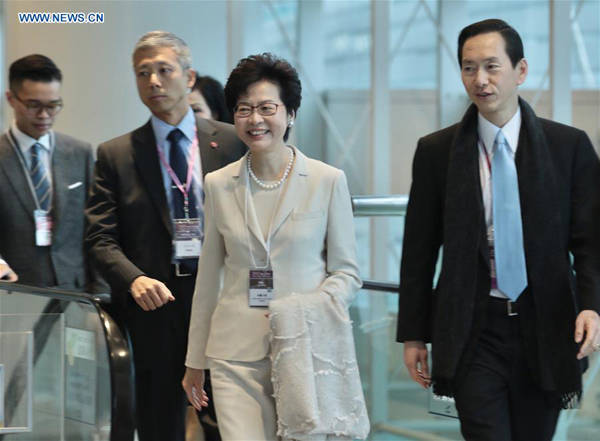Bill Gates hails China ‘best place’ for ambitious youth
|
Bill Gates, former chairman of Microsoft Corp and chairman of the Bill & Melinda Gates Foundation, receives a table tennis paddle from Peking University in Beijing on Friday. Gates talked with students after delivering a speech at the university and was invited to play a game of table tennis. [Photo by Zhu Xingxin/chinadaily.com.cn] |
Once widely considered the world’s richest man, Microsoft founder Bill Gates has said China is the “best place” for the young to fulfil their ambitions to make the world a better place.
In a Friday lecture to Peking University students, the billionaire philanthropist described the skepticism in some developed countries about whether globalization works for ordinary people.
He said the results of the U.S. presidential election and the Brexit vote showed how any country may turn inward when confronted with difficult issues like immigration, security and global development. In a world suddenly short of experienced leaders, Gates commended China for assuming greater responsibility for critical global issues like climate change and inclusive development.
Gates told hundreds of students attending the lecture of his high hopes for China’s youth as they enter the workforce at the time of “China’s rise as a center of global progress and innovation.”
“The world’s eyes are on China…the world’s eyes are specifically on all of you… What an incredible thing is the belief that you can make the world a better place. There has never been a better moment.”
Gates said China has to deal with the most urgent challenges the world faces.
Health, agriculture, energy, and technology are areas where Gates sees “exciting opportunities” for more “amazing progress” for China and for the world.
Gates believes China could lead the world in eradicating malaria. He commended Tu Youyou’s discovery of artemisinin, which won her a Nobel Prize in 2015, and said there was need to develop more powerful tools — like a single-dose treatment — to block transmission of the malaria parasite form mosquitos to humans. More than 3.2 billion people in the world still live with the risk of malaria infection, he said.
On agriculture, Gates said China’s continuing advances in rice growing could benefit to millions of small farmers in Sub-Saharan Africa. Gates’ foundation has keen interest in Africa and is working with the Ministry of Commerce and Ministry of Agriculture on sustainable agriculture throughout Africa.
He said China understands that helping other countries creates a more stable and secure world for people everywhere.
The founder of Microsoft sees great potential in China’s tech sector. A lab he set up in Beijing about 20 years ago has grown into Microsoft’s largest research center outside the United States with some 200 of the world’s top researchers, developers and more than 300 visiting scientists and fellows.
He said the lab also supports up-and-coming software developers by hiring more than 5,000 interns.
“Maybe you want to develop the next vaccine that protects everyone from malaria. Maybe you want to design the battery that lights people’s desks at night…” he told students.
“No matter what, if your ambition is to improve the world, this is the best time and the best place to do it.”
